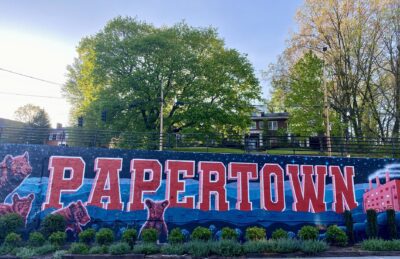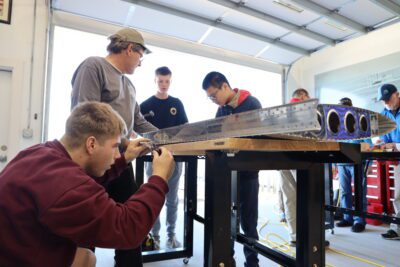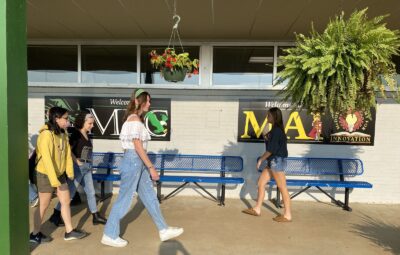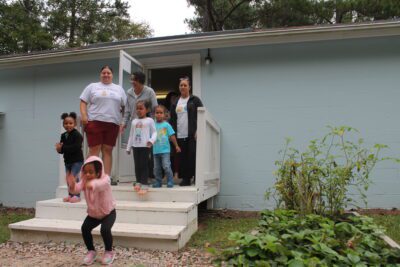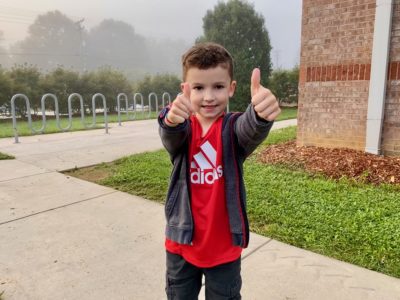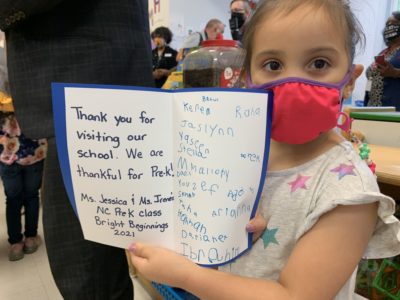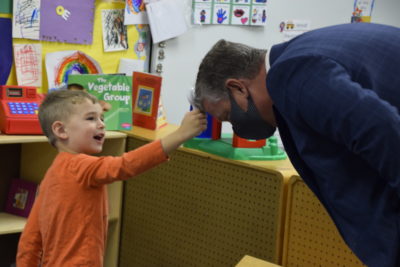

EducationNC’s 2023 Annual Report
Highlights
- Ahead of our 10th anniversary, EdNC is aligning our theory of change, outputs, outcomes, and key performance indicators with our direct, widespread, and systemic impact as well as launching a new survey to track our ripple effects.
- 2023 highlights include national recognition for our early childhood reporting and research, the ripple effects of our blitz of all 58 community colleges, completing the 100-county Extra Miles Tour, and providing strategic support in Canton, which had the state’s largest layoff of the year.
- As school choice expands across our state, EdNC is documenting the ripple effects in all 115 school districts, all 58 community colleges, and all 100 counties.
- EdNC’s work ensures that people, philanthropists, and policymakers understand all the reasons why child care, our public schools, and our community colleges matter to the future of North Carolina.
When you take into account the expansion of school choice, the governor’s state of emergency for public schools, and the federal funding cliff that looms in 2024, it’s been a big year for education and a big year for EducationNC.
EdNC’s mission is and has always been to expand educational opportunities for all students in North Carolina, increase their academic attainment, and improve the performance of the state’s public schools.
Public schools matter. They matter for our students. They matter for our state. They matter for our future.
Public schools anchor our communities. In many of our rural counties, they are the largest employer and economic engine of the counties they serve.
They also anchor our educational continuum, from providing early childhood education to dual enrollment opportunities in postsecondary education.
In 2023, EdNC brought in national experts to help us think better about how to communicate via news and research on these policy shifts and challenges, and we invested in an economic impact study of our public schools to be released in 2024.
As school choice expands across our state, EdNC has been and will continue to document the ripple effects in all 115 school districts, all 58 community colleges, and all 100 counties.
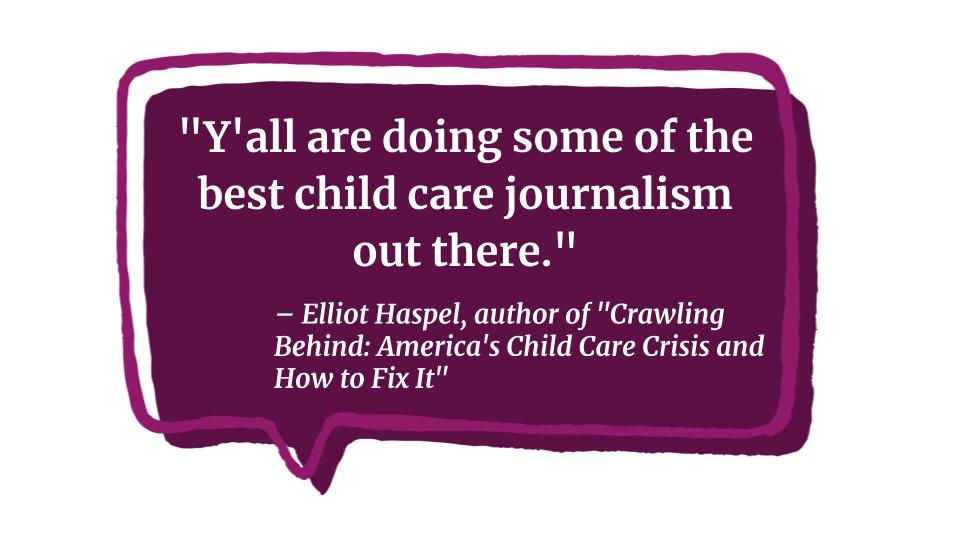

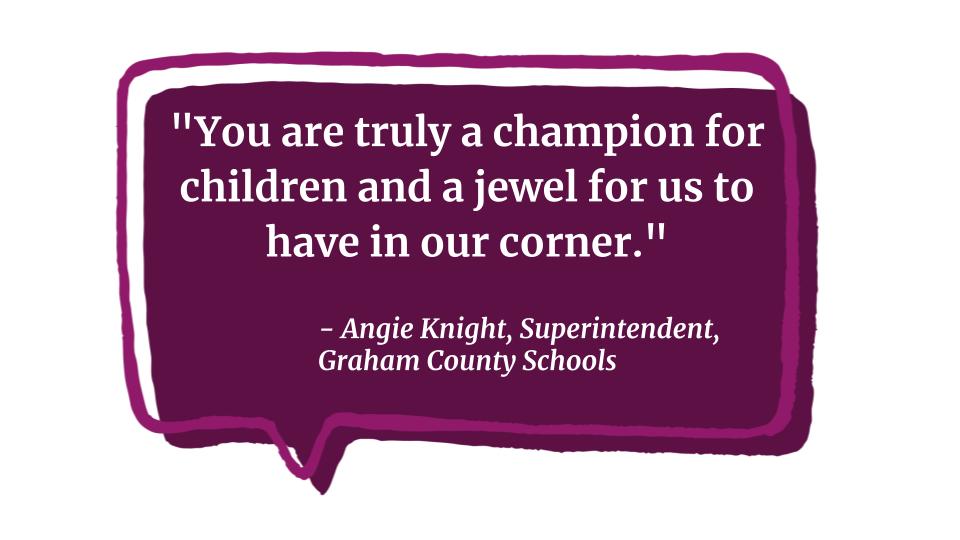

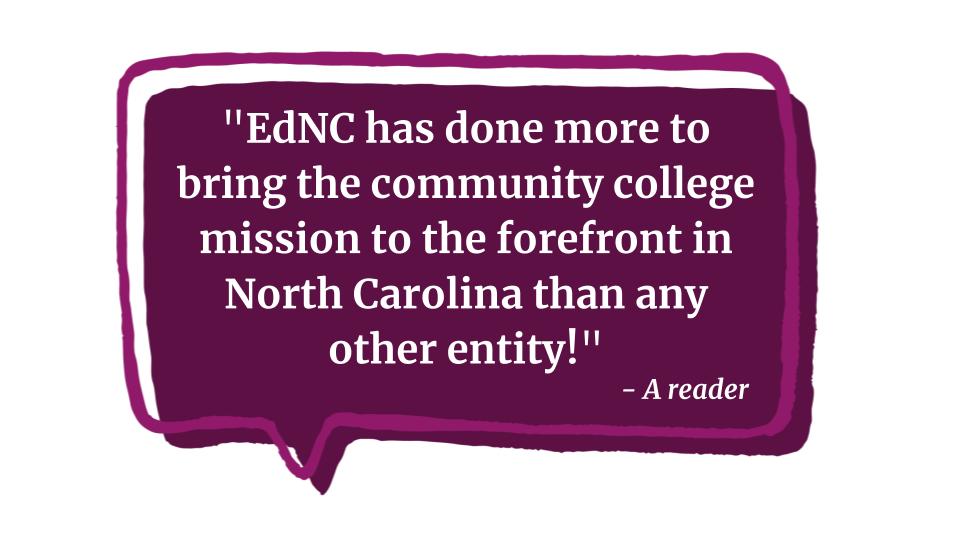

Looking ahead to our 10th anniversary in 2025
At this critical moment in time for education across North Carolina, EdNC has engaged in a process to make sure that not only are we doing the work, but we are doing our best work.
How to think about impact
This article in the Harvard Business Review is about measuring the impact of ideas well.
When leaders and organizations are thinking about impact there are four risks: thinking no one else can do the work, looking for the easiest way to assess impact, only assessing impact internally, and not assessing impact against market demand.
Aligning our work to drive impact
To proactively address the four risks in assessing impact, ahead of our tenth anniversary in 2025, EdNC’s leadership team set out to think about how to align our theory of change, outputs, outcomes, and key performance indicators with our impact.
This chart explains how we believe our direct, widespread, and systemic impact is driven by what we do and why we do it.
In a state that stretches from Murphy to Manteo, it has been challenging for EdNC to map the ripple effects of our team and our work. Traditional ripple effect mapping is both too expensive and too time-intensive for us to deploy consistently everywhere we show up.
In 2024, we are launching this ripple effect survey to better map the impact of our team going forward.
Reflective practice informs our moving forward
Our reflective practice ahead of our 10th anniversary in 2025 includes documenting how and why EdNC was founded, key decisions and strategies in the startup and stabilization phases of our organizational development, a case study of our news strategy, and assessments of SWOT (strengths, weaknesses, opportunities, and threats) and PEST (political, economic, societal, and technological challenges) in the years to come.
As we continue to learn and iterate how to do our work well, thank you for your ongoing support.
EdNC’s Theory of Change
1) On the ground in your communities
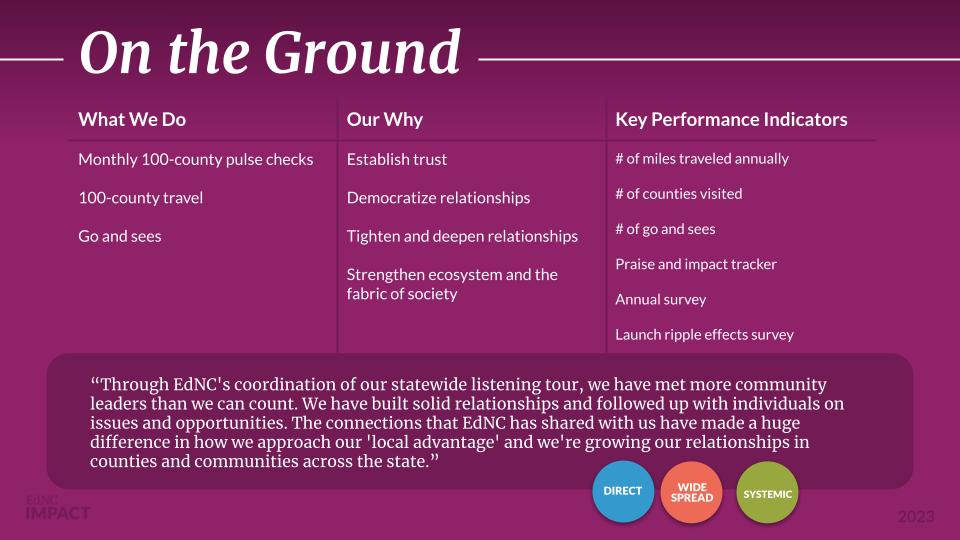

From the beginning of EdNC, showing up in your communities in person has mattered in building and then strengthening our relationships with you.
Along the way, we realized it was important not just for us to show up, but for us to bring philanthropists, policymakers, and others in positions of influence to your communities to shrink the distance between those on the ground and those in power.
Journalism has long sought to democratize access to information. We believe these visits democratize relationships. It is a way of sharing privilege.
We call them “go and sees,” and we have developed a variety of different formats each with a different purpose and impact.
We take groups of cross-sector stakeholders to visit communities. We call these “24 hours in.”
Our team conducts research to study different issues in-depth. We call these a “blitz.”
We take groups of stakeholders to learn more about promising practices, visit schools and community colleges, or even visit all 100 counties.
The purposes of our “go and sees” vary, but include establishing trust, sharing relationships, developing co-learning journeys, checking our assumptions, conducting both qualitative and quantitative research, informing grantmaking and policymaking, and aligning and building momentum for collective action in addition to storytelling.
We believe “go and sees” strengthen the educational ecosystem and the broader fabric of society. In all of our travel, we strive to be mindful of extraction and poverty tourism, and to be clear with all involved about the purposes of the “go and see.”
In 2023, examples of our work include Nation Hahn’s leadership on the Extra Miles Tour, Liz Bell’s leadership on the “school’s not out” series on early care and education during summer, and Anna Pogarcic’s leadership and EdNC’s team coverage of back to school.
In 2023, the EdNC team drove 50,000 miles. Liz Bell and Katie Dukes traveled another 13,000 miles to five states — by planes, trains, cars, and boats — from Salem, MA to Salem, OR.
2) Journalism as the fourth estate in a democracy
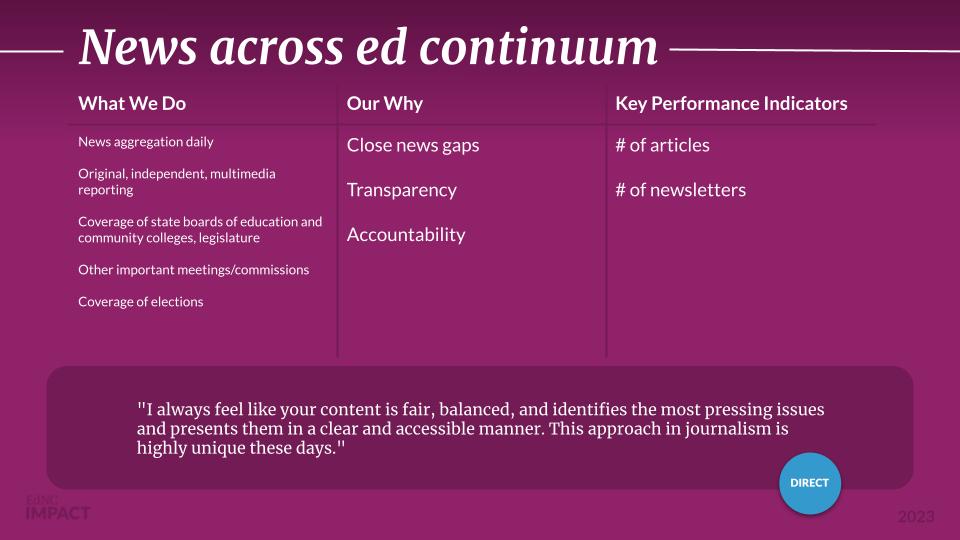

EdNC covers the continuum from birth to career, and since our beginning we have known we can’t cover education without also covering poverty, health care, nutrition, and the economy.
Our team uses a layered media strategy to engage our audience, starting with social-first content when we are out on the road.
Our news documents in real time what is happening — when and where and why, providing comprehensive coverage of issues, covering stories over time, and conducting enterprise projects.
Here you can see EdNC’s top news stories in 2023.
This year, EdNC was the go-to source for reliable information on the presidential search process for the community college system.
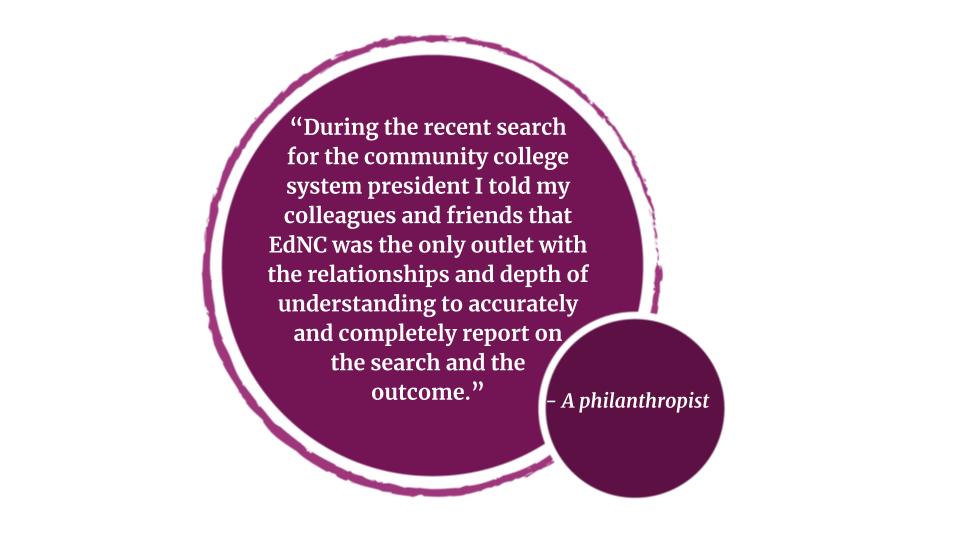

Our multimedia capacity allows us to infuse our work with graphics, audiograms, podcasts, videos, and short- and long-form documentaries.
In 2023, Caroline Parker and Cheyenne McNeill took EdNC’s podcasts to the next level, including broadcasts by local and public radio.
EdNC’s first full-length documentary, “My Name Is Merle,” won the Best History + Documentary Award at the 2023 Longleaf Film Festival thanks to the leadership of Robert Kinlaw. Featured in Garden & Gun, the documentary will debut on PBS North Carolina in April 2024.
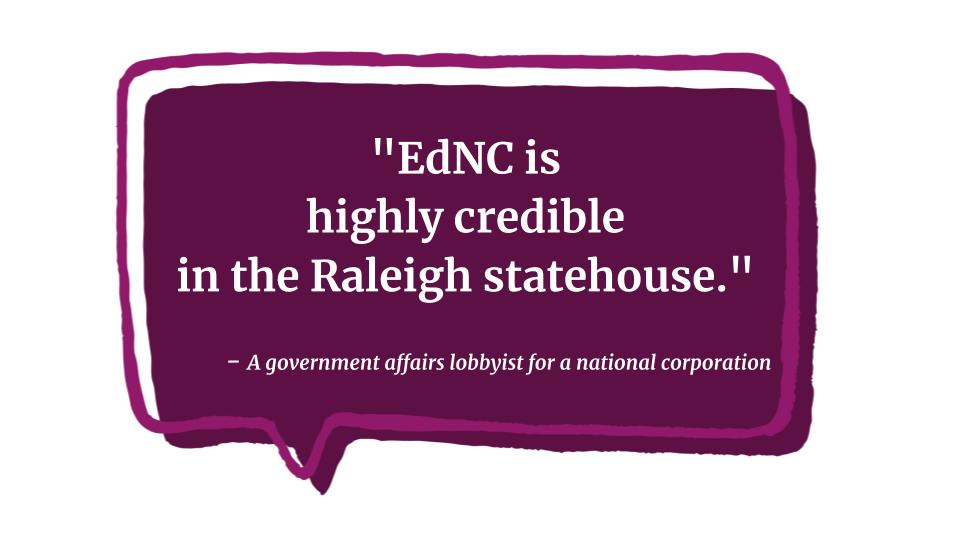

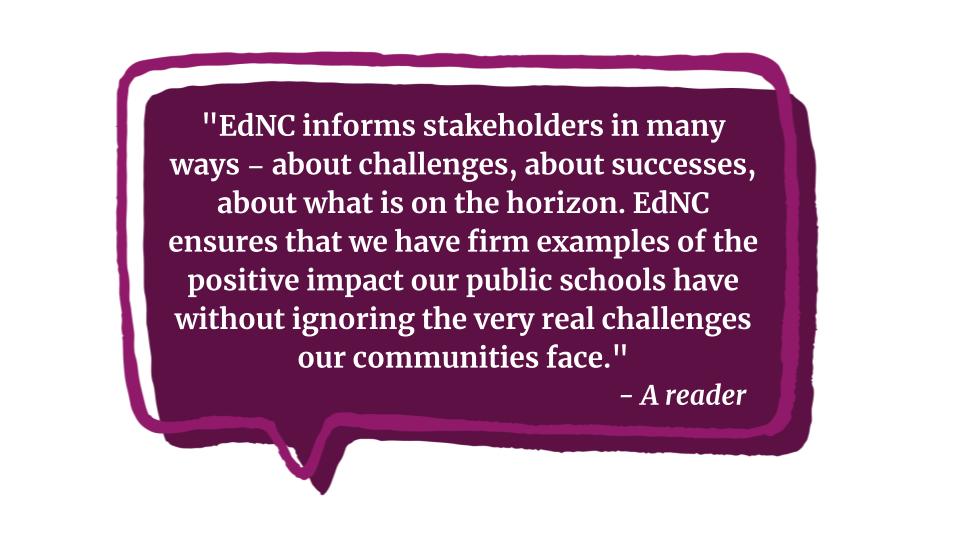

3) In-depth research
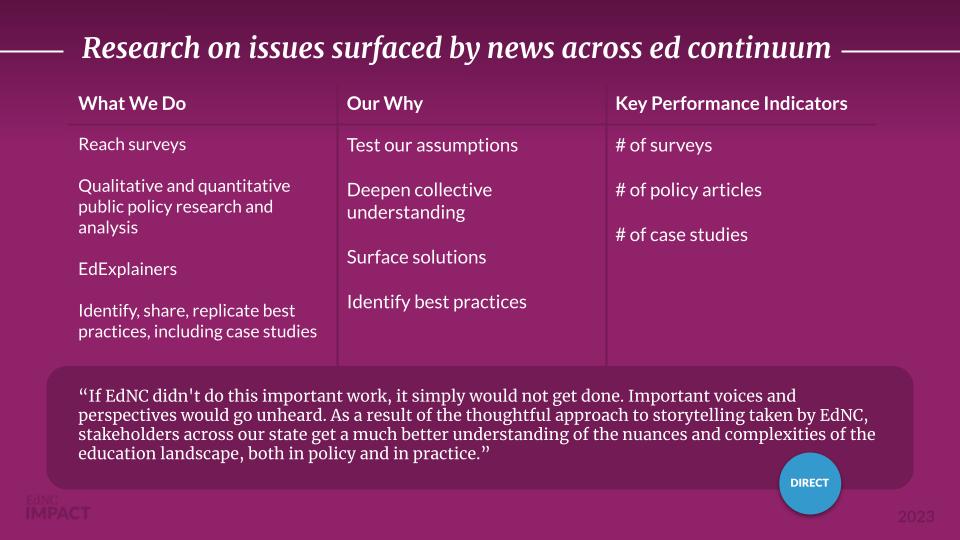

EdNC conducts in-depth qualitative and quantitative research, policy analysis, and surveys on the issues surfaced by the news. Emily Thomas is piloting a case study approach aligned with philanthropic funding to scale best practices that we look forward to sharing in 2024.
EdNC’s blitz leads to the identification of five indicators of financial health of community colleges
In fall 2022, EdNC visited all 58 community colleges as part of our Impact58 blitz thanks to the leadership of Alessandra Quattrocchi. We learned about early colleges, dual enrollment, funding, and more.
Our research during the blitz led our leadership team to identify five indicators that contribute to the financial health of the colleges and impact how well colleges are able to serve their communities. Hannah McClellan then conducted in-depth research on the five indicators, including 1) individual state budget appropriations, 2) county support, 3) the rate of dual enrollment, 4) foundations and philanthropic support, and 5) receipts from student tuition and other fees.
Leading on child care in North Carolina and nationally
Combining solutions journalism and public policy analysis, Liz Bell and Katie Dukes have conducted ground-breaking research across North Carolina and in five other states to document what is and isn’t happening in early care and education, but more importantly what must happen moving forward.
“‘Experts make the urgent case’ was a turning point in our ECE reporting in the way it so strongly linked policy with practice and with consequences, the way it laid out the broad societal effects of failures in child care, and the way it made a case for viewing child care as a public good,” notes Eric Frederick, EdNC’s editorial advisor.
After the article was released, Governor Roy Cooper sent this letter to the state’s congressional delegation.
Bell and Dukes then identified four effective strategies other states used to move toward making early care and education a public good: advocacy from the business community, grassroots organizing, streamlining governance, and identifying/creating new funding streams.
Survey of parents
Using Reach NC Voices, EdNC surveyed parents in Western North Carolina in spring 2023. The survey was open from March 26 through May 31, 2023. We had 3,097 parent respondents, and amazingly the respondents stuck with us through many open-ended questions, providing a wealth of information about how parents think about schools. The open-ended questions shown to all participants received between 1,178 and 1,973 comments. Surveys like these inform our work as well as the work of philanthropists and policymakers.
Multi-year research on the science of reading
Rupen Fofaria has led EdNC’s nationally-regarded reporting and research informing state policy on the science of reading since December 2019, including this 2023 series.
On the local level, EdNC has been working with the Edgecombe County Public Schools to pilot an equity-based model of science of reading implementation. We believe this pilot will demonstrate that serving highest need students first will mean better and faster gains for our students and our state. Fofaria will continue this work in his new role as executive director to the N.C. State Board of Education.
4) Building and engaging our audience
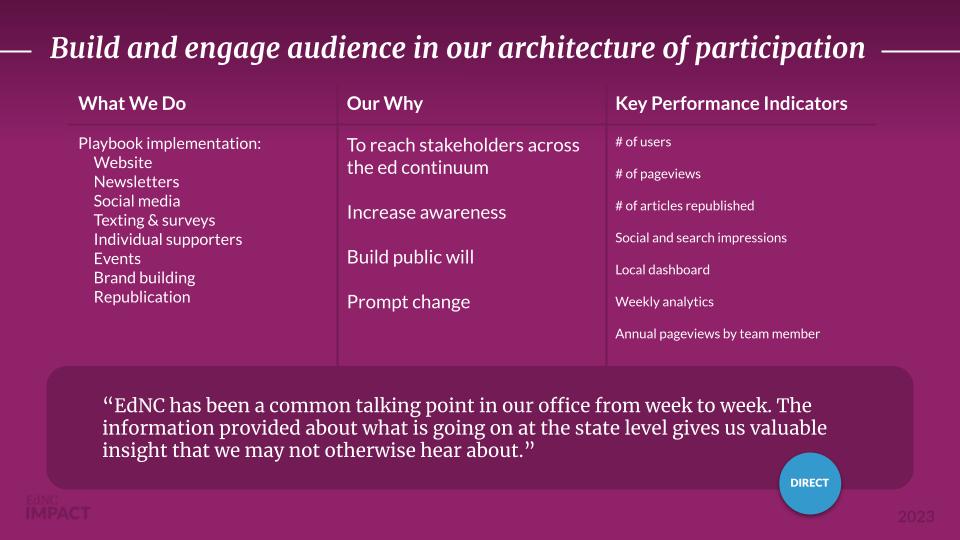

EdNC launched with an audience of 0 in 2015, and now day-to-day we truly have statewide reach.
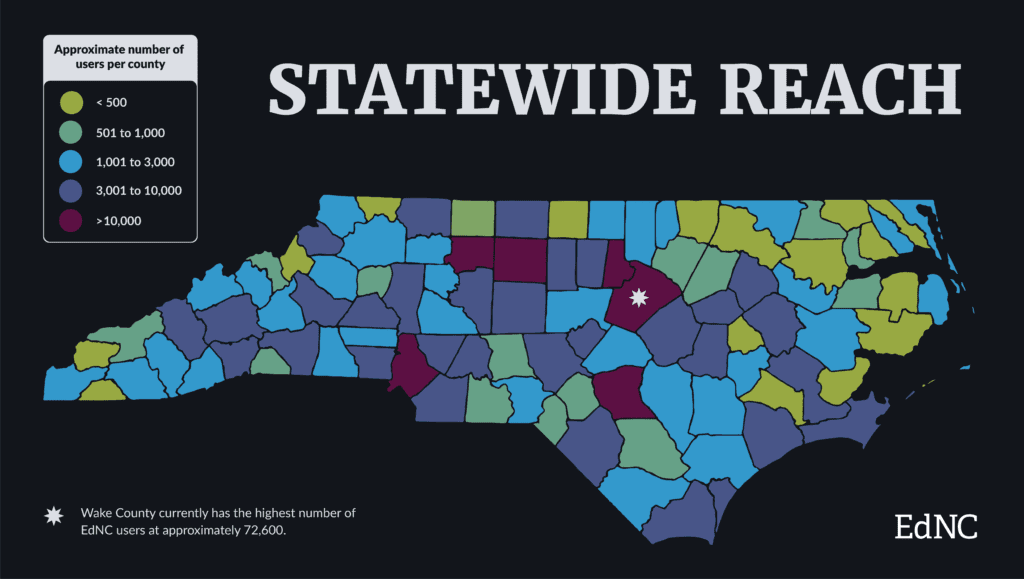

Annually, EdNC iterates our audience playbook for content distribution, audience growth, and engagement, including our website; email, including newsletters; social media; Reach, our suite of tech tools, including texting and surveys; fostering belonging, including individual donations; events, including ours and others; brand building, including swag and sponsorships; and leveraging redistribution and republication.
2023 brought us two pain points in audience engagement: the shift to Google Analytics 4 and ongoing changes in how social media platforms distribute the news.
The year also brought us new opportunities with ethical implications as news outlets begin to explore how to integrate artificial intelligence in our work.
EdNC has 50,000 impressions on social media a day, we send out 305,592 emails a week, we had 1,079,859 users and 1,677,433 pageviews of our website, and we had 24.3 million impressions on Google search in 2023.
An external review of our audience growth and commitment to continuous improvement found we do these things well:
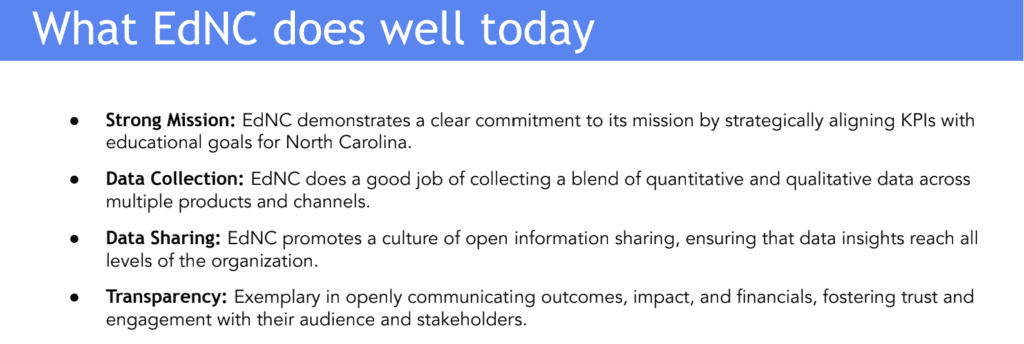

EdNC shares our platform with a commitment that at least 20% of perspectives published are written by people of color — in 2023, we hit 28%. Here is information on how to submit a perspective.
We offer free subscriptions to four newsletters: EdDaily, EdWeekly, Awake58, and Early Bird. Most of you — 74% — get your information from us via our newsletters. You can sign up for all of them here.
This year, 184 EdNC articles were republished by other news outlets, allowing our coverage to reach audiences we may not have otherwise reached locally and nationally. Newsletters such as N.C. DPI’s daily education news clips, the North Carolina Tribune, the NC Insider, The 74, and Education Commission of the States often point to our content, allowing us to reach key influencers in education and policy. Also in 2023, Apple News started distributing our content. Here are our republication guidelines.
None of our content is behind a paywall because of our commitment to equity.
Nation Hahn leads our external event design, and this year the events he planned for those working with adult learners and on postsecondary access and attainment raised the bar.
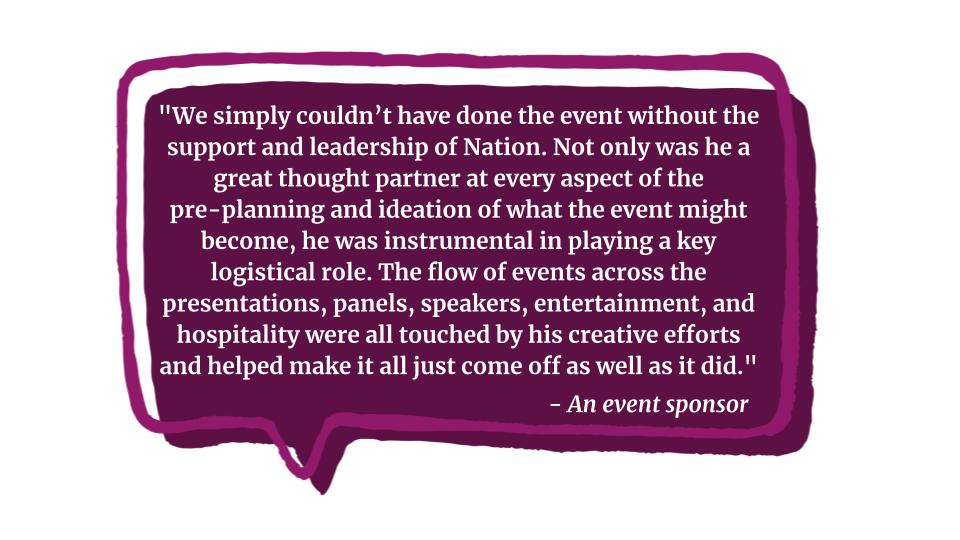

Each year, we survey you — our audience — to assess and track our impact. This year, 2,440 of you took our annual survey — even more than last year! Highlights include:
- Fifty-two percent of respondents were K-12 teachers, 20% were community college faculty, 9% work in child care.
- Our respondents were 27% nonwhite, including 14% Black.
- EdNC prompts discussion: 68% of you discuss things you read on EdNC with your colleagues, and 35% share our articles. Remember when you share our articles on social media (versus just “liking” them), you are extending the reach of our work to those in your orbit, and that makes a difference.
- Thirty-six percent of respondents directly applied knowledge gained from EdNC in their professional life.
- Fifteen percent changed your mind because of our work, and 10% of you went on to talk to a policymaker.
- Just 7% of you don’t think we are providing a neutral view of what’s happening in education. In these polarized, politicized times, we take that as a win.
Collectively, our audience breathes life into the “architecture of participation” we built to tell the story of your commitment to our students, our state, and our future.
5) Leading innovation in the new media and nonprofit world
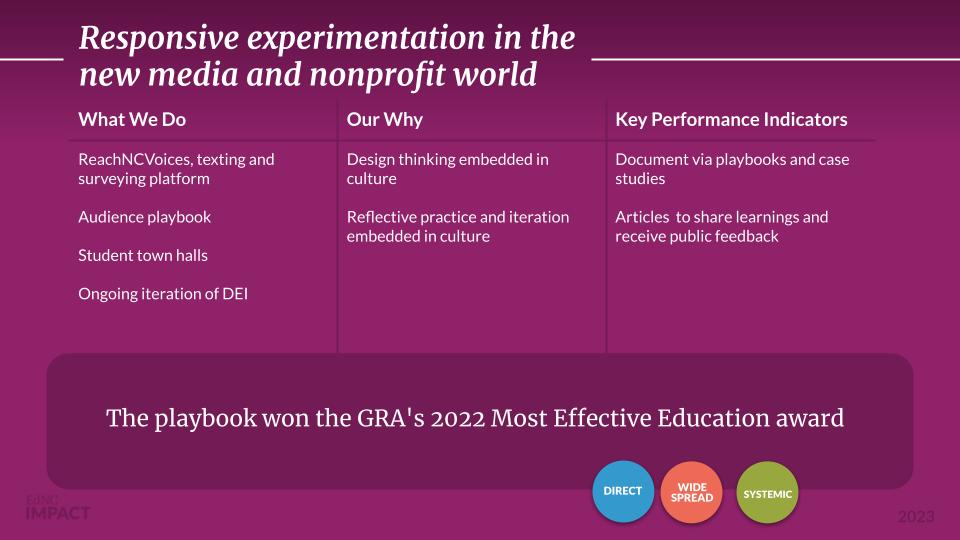

On March 6, 2023, Pactiv Evergreen announced in an earnings report that it would be closing a 100-year old papermill in Canton, a small town just west of Asheville in Haywood County.
It turned out to be the largest layoff in the state in 2023.
Haywood is a county EdNC knows well.
Three factors made this mill closing different.
First, unlike other mill closings, there was no notice. Second, the mill is the town both physically and culturally, located on 185 acres right in downtown Canton. And third, this county has been through it. On top of the pandemic, in August 2020, there was a cyberattack on the school system. One year later, in August 2021, there was 100-year historic flooding.
There is a phase of disbelief and disorientation when an economic disaster happens that is different from natural disasters (where the policies and procedures are in place at all levels of government, and it is well established what to do). In our small rural communities, the leaders are already overworked and under-resourced all of which makes that initial crisis period until resources start flowing really critical and unreasonably stressful.
EdNC piloted an innovative model of crisis intervention to provide support for local leaders to protect educational anchor institutions – including child care capacity, the school district, the early college, and the community college.
A consolidated legislative request by the town, county, district, and community led to more than $60 million in relief, and to date more than $3,025,000 in philanthropic contributions for community recovery has been secured.
Early lessons learned include:
- During a crisis, expect cycles of harmony, disharmony, and repair among the leaders who are operating under an enormous amount of stress. Have a plan to maintain momentum. Momentum matters.
- A bipartisan approach matters in a diverse county like Haywood and a diverse state like North Carolina.
- It is in the public’s best interests for the town and the county to have a seat at the table when site control is being discussed.
- Economic relief is needed for educational anchor institutions to hold them steady through the crisis.
- Workers will avail themselves and their families of health care insurance subsidies if trusted, local leaders manage the assistance.
- From the beginning, this was designed to be a short-term intervention strategy until philanthropic and government resources could be secured to fund the longer term recovery in Canton, Haywood County, and the region.
Local leaders have described the first weeks after the closing was announced as a period of “shock and awe,” noting that this strategy provided concrete steps week to week to move forward.
EdNC and local leaders were honored by the Haywood County Board of Commissioners in December 2023.
6) Tracking the impact of our work and moving the needle on policy change
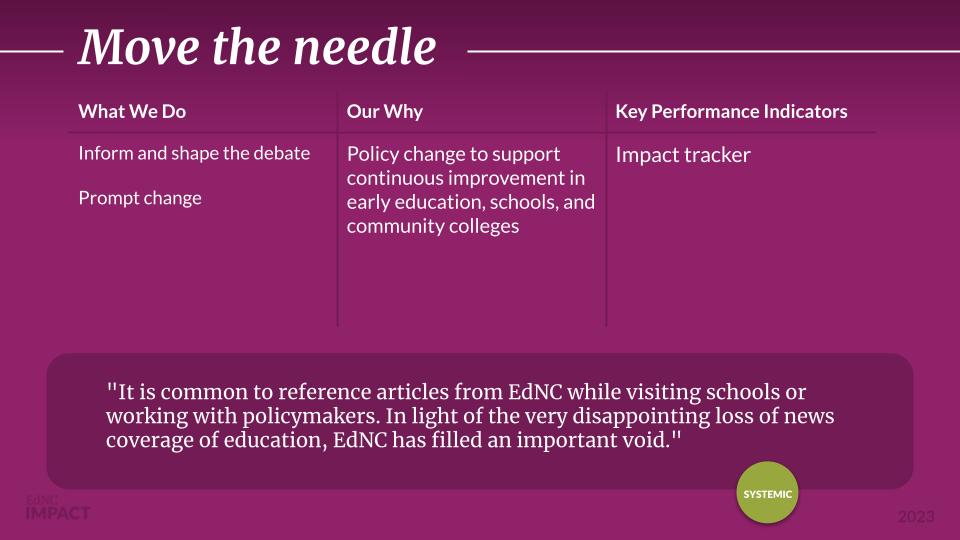

EdNC strives to inform and shape the conversation about education in North Carolina. We love it when the information we publish is used to prompt change.
Our reporting on arts and education made a difference thanks to advocates who shared the information with legislators, leading to an arts proficiency high school diploma endorsement, which will encourage more students to participate in the arts.
Our reporting on using Medicaid to fund mental health supports in schools led to this solution being replicated in other places around North Carolina.
When bad survey data on educators and indecent liberties made its way into policy conversations at the legislature, we shared our research with legislators to set the record straight.
Attorney General Josh Stein announced an additional $7.8 million from a settlement agreement with Juul. In all, the state will receive $47.8 million. The complaint in the lawsuit cites the reporting of EdNC. Multi-district litigation against Juul followed, and districts are now receiving settlement funds, including in Pitt and Wake Counties.
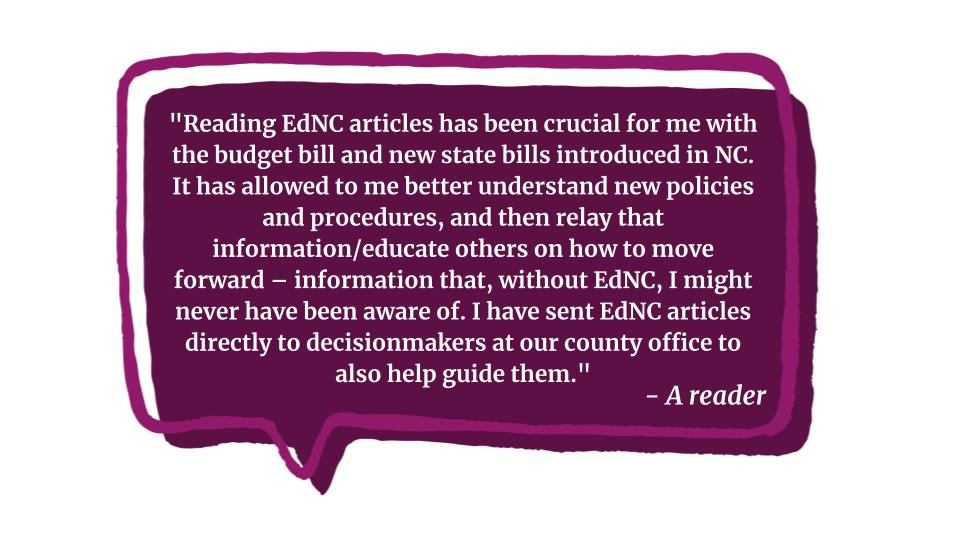

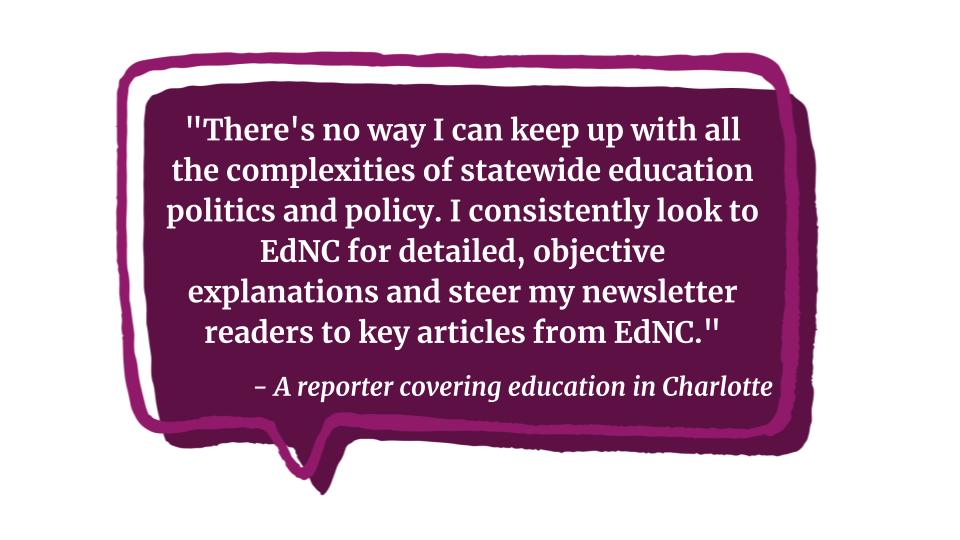

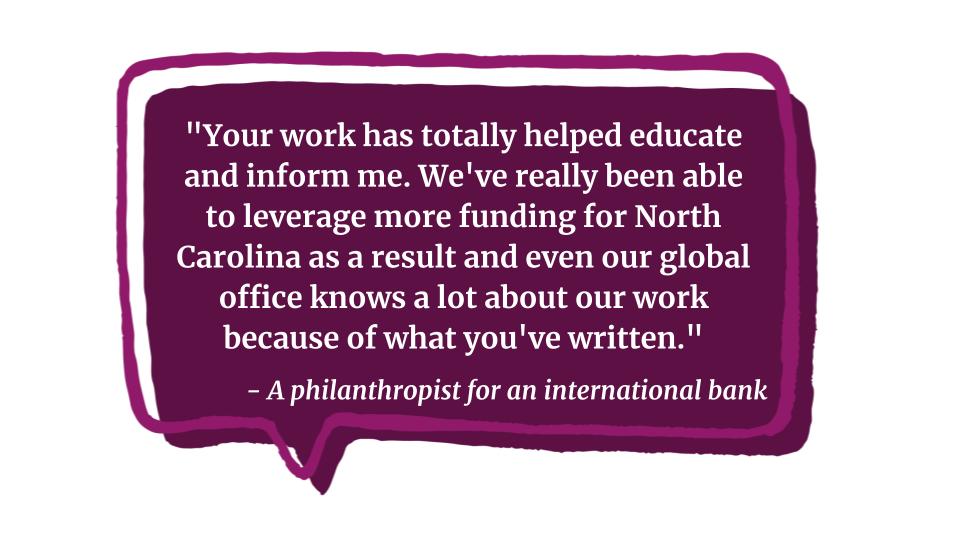

7) Increasing leadership capacity statewide
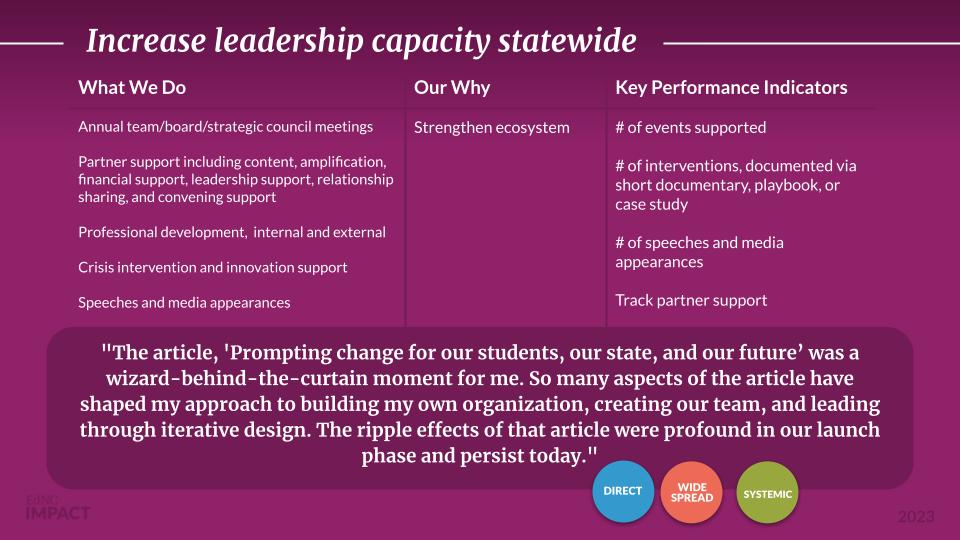

EdNC believes in collective and distributed leadership that is service oriented. We work together as a team of peer experts and thought leaders.
Mebane Rash is the founding CEO and editor-in-chief. Nation Hahn was on the founding team and serves as our chief of growth. Liz Bell is our early childhood reporter and perspectives editor. Molly Osborne Urquhart is vice president and director of operations. Caroline Parker is our director of rural storytelling and strategy. Eric Frederick is our part-time editorial advisor. Emily Thomas is a policy analyst with a focus on community colleges, postsecondary access, and attainment. Anna Pogarcic is our director of content and communications. Katie Dukes is our early childhood policy analyst and perspectives editor. Hannah McClellan is our senior reporter. Derick Lee leads our partnerships with leaders of color and organizations committed to equity. Alli Lindenberg is our executive fellow. Lauren Castillo is our associate director of operations. A’brianna Dones is our John M. Belk Endowment Fellow. We were delighted to welcome reporters Chantal Brown and Laura Browne to the EdNC team in fall 2023.
EdNC is deeply thankful for the leadership of Osborne and Castillo, who day-to-day manage the operations of the organization with an excellence that is both aspirational and inspirational, and allows the rest of us to focus on content and be on the road out in community.


Alex Granados, our senior reporter since EdNC’s very beginning, has served as special advisor on academic policy and research to the state superintendent since March 2023. Rupen Fofaria, who led our equity and learning differences reporting including literacy, has served as the executive director of the N.C. State Board of Education since October 2023.
Our work in 2023 was supported by Sonia Rao, Lanie Sorrow, and Landon Weyenberg.
You may have heard about EdNYC, our outpost in New York City. Alessandra Quattrochi continues to copy edit for us while she is getting her law degree at NYU. Cheyenne McNeill, a recipient of the prestigious Chips Quinn Scholars Program for Diversity in Journalism, serves as an EdNC fellow and contributor while she attends graduate school for a masters in fine arts at NYU’s Arthur L. Carter Journalism Institute. Analisa Sorrells — who authored a chapter in this book on community colleges in 2023 — is also in the city along with Sergio Osnaya-Prieto and Patrick Archer.
Our thanks to Tara Kenchen, Kelley O’Brien, Robert Kinlaw, Dan Gerlach, Bridgette Cyr, Caryn Sterling, Unity Web Agency, and Outfitters4, who play invaluable roles on our team. Many thanks to our attorney, Amanda Martin, and our accountants, Batchelor, Tillery & Roberts, LLP.
A few highlights from our 2023 leadership investments:
- Anna Pogarcic is the youngest news leader ever to be selected for Poynter’s Media Transformation Challenge.
- Rupen Fofaria and David Cruz, a Fulbright Scholar who will be consulting with EdNC in 2024, attended the Aspen Institute’s executive seminar.
- Derick Lee was selected to be in the 2023-25 class of Friday Fellows. The William C. Friday Fellowship for Human Relations is a statewide program for cross-sector leaders, dedicated to fostering relationships across differences.
- Xavier Adams, the 2022 Beginning Teacher of the Year, is participating in the Public School Forum’s 2023-24 cohort of Education Policy Fellows.
- Caroline Parker was selected to participate in the NC Rural Center’s Rural Economic Development Institute. REDI is the Center’s flagship leadership program, offering participants collaborative training in leadership skills and rural development strategies to help make meaningful impact in their rural communities.
- Chantal Brown will be an Education Writer’s Association Reporting Fellow and was selected for EWA’s Diving into Data workshop in 2024.
- Katie Dukes advised a group of Duke graduate students on a consulting project identifying states that could serve as a blueprint for North Carolina’s approach to early childhood policy. She also attended the National Institute for Computer-Assisted Reporting (NICAR) conference.
- Nation Hahn attended Engaging Emergence: Advancing the Future of Journalism for All in Philadelphia.
- EdNC and SAS convened Mebane Rash’s Harvard Kennedy School Women & Power alumnae from around the world in Cary. Rash, Anna Pogarcic, and A’brianna Dones were invited to speak on a panel about access to opportunity and power.
- The principals of the year convened and have been working together to support principals across North Carolina. EdNC is providing support for their collective voice.
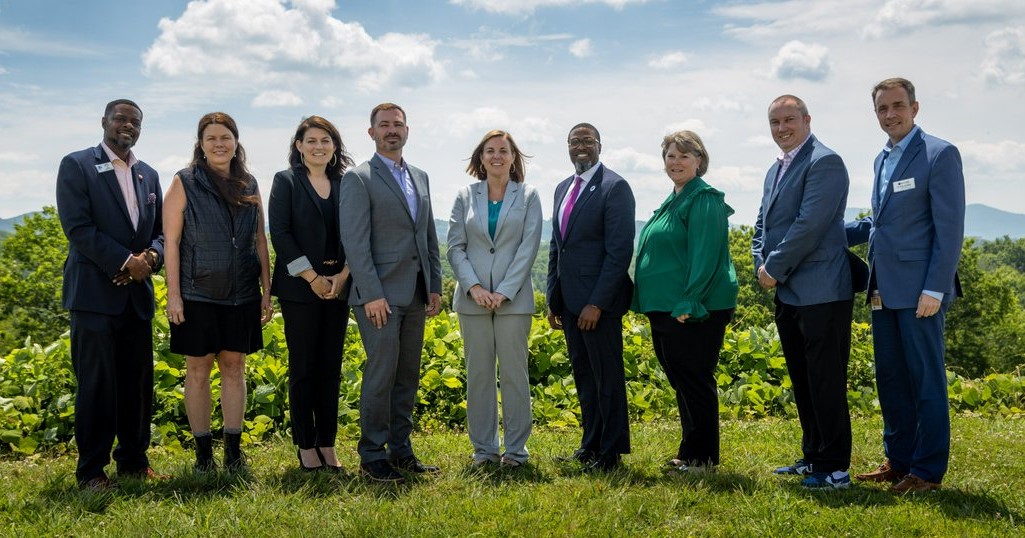

8) DEI + belonging
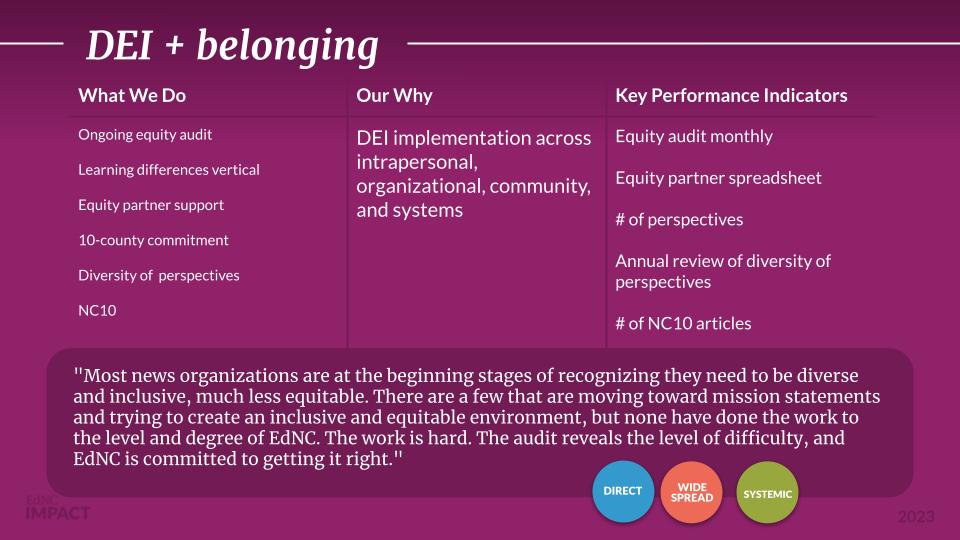

The work of diversity, equity, and inclusion (DEI) happens in the small decisions made in the day-to-day. At EdNC, we approach the work intentionally through four dimensions: intrapersonal (this is the “I” work), organizational (this is the “we” work), community presence (this is “our walk”), and systems change (this is “the way” forward).
In 2023, we announced our process for an ongoing equity audit.
And today in early 2024, we announced our process for assessing choice points between article inception and distribution.
Our commitment to equity includes supporting and amplifying the work of others. In 2023, Derick Lee led an analysis of our “force amplification” of other leaders and organizations, identifying five key levers:
- Amplification: inclusion in newsletters, posting and boosting on social media;
- Content: profiles of leaders, event coverage, publication of perspectives, creation of social first and multimedia content;
- Leaders/Organizations: monthly or quarterly check ins;
- Financial: sponsorships, grant writing, sharing other financial assets; and
- Resources: sharing relationships and networks, sharing our team.
In 2023, Derick Lee provided targeted support to LENS-NC, CREED, the Dudley Flood Center for Educational Equity and Opportunity, LatinxEd, Teach for America North Carolina, Profound Gentlemen, Profound Ladies, and ISLA. He also covers the DRIVE task force and AVANZA.
EdNC has our own content expectations for the eight majority Black counties and two Indigenous counties to address historic undercoverage by the media, including Bertie, Edgecombe, Halifax, Hertford, Northampton, Robeson, Swain, Vance, Warren, and Washington.
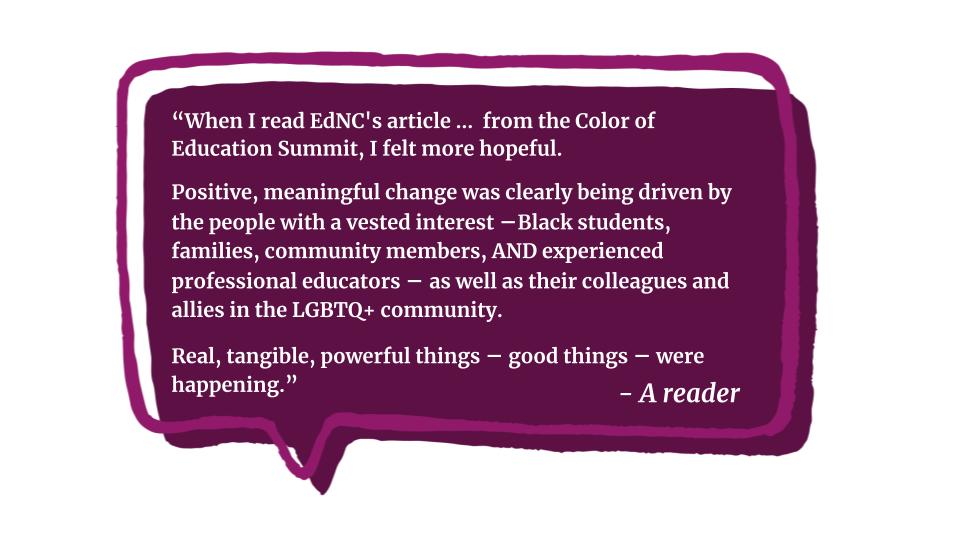

9) The broad base of financial support
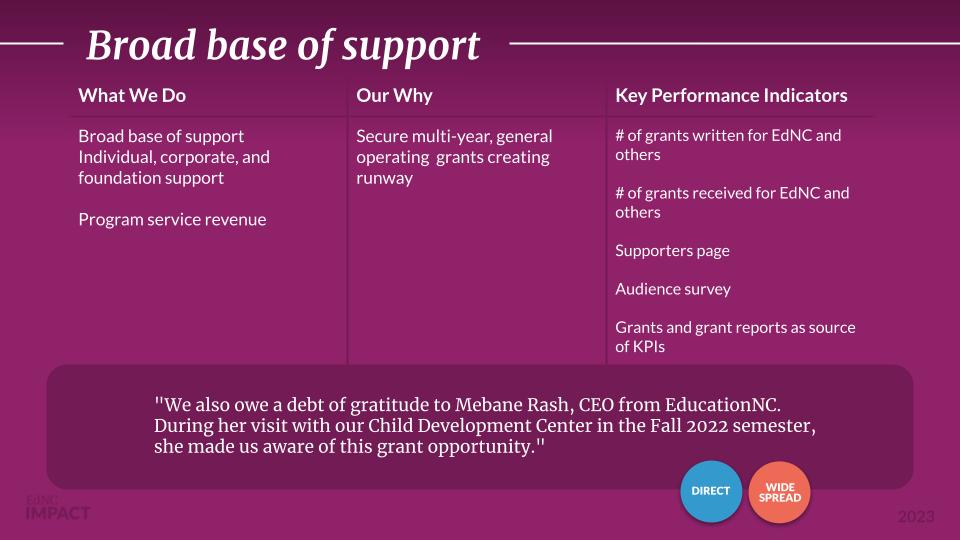

Our funders breathe life into our work. Here are our supporters by year. Thank you!
EdNC writes grants for others in the education ecosystem as part of our commitment to equity and systems change. In 2023, EdNC’s grantwriting secured $1,120,000 in funding for others.
About EdNC
EducationNC has been operating online since Jan. 12, 2015, and June 30, 2023 marked the end of our ninth fiscal year. EdNC is a registered trademark with the N.C. Secretary of State and the United States Patent and Trademark Office.
Our mission is to expand educational opportunities for all students in North Carolina, increase their academic attainment, and improve the performance of the state’s public schools. We provide residents and policymakers with nonpartisan data, research, news, information, and analysis about the major trends, issues, and challenges bearing on education. We gather and disseminate information employing the most effective means of communication, primarily through the Internet. In addition to the content distributed, we encourage an active and connected community of those interested in education policy and practice throughout the state. Our work encourages informed participation and strong leadership on behalf of the students of North Carolina.
To date, we have published 7,821 articles lifting up just over 1,441 voices from across our state, collectively writing the story and history of education in North Carolina.
Here is our statement on journalistic independence.
Here is our statement on safeguarding children.
EdNC’s Board of Directors and Strategic Council
In 2021, EdNC changed our governance model to align with our diversity, equity, inclusion, and belonging commitment.
Here is who currently serves on our board and strategic council.
EdNC’s Annual Report and Financials
Here are EdNC’s previous annual reports. Here are EdNC’s audited financial statements and tax returns.
Thank you for your ongoing support of EdNC. It is our privilege to do this work, and we could not do our work without you.
Expect great things from us, and please donate so we can continue to grow our impact in 2024 and beyond.






